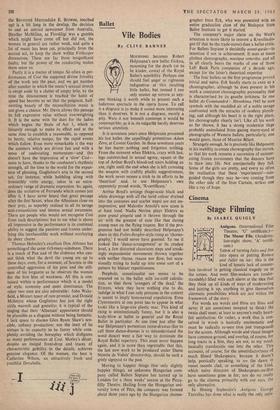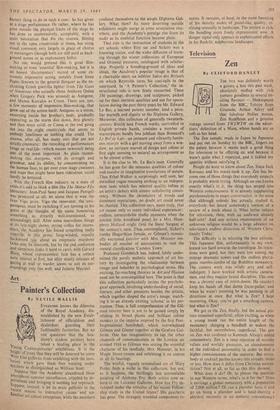Cinema
Stage Filming
By ISABEL QUIGLY
• THINK of turning Jules and Jim into opera or putting Romeo
• and Juliet on ice: this is the
kind of lunatic lack of connec- tion involved in getting classical tragedy on to the screen. And most film-makers are (under- standably) filled with such alarm at the idea that they think up all kinds of ways of modernising and jazzing it up, anything to give themselves cinematic possibilities which are lust within the framework of the story.
For words are words and films are films and never (I am sometimes tempted to think) the twain shall meet; at least to anyone's really heart- felt satisfaction. Or rather, a work that is con- ceived in words is basically uncinematic and must be radically re-seen (not just transposed) for the screen. Although words and visual images have common ground, and overlap, of course, for long tracts in a film, they are not, to my mind, basically translatable one into the other. This accounts, of course, for the unsatisfactoriness of much filmed Shakespeare, because it doesn't help, poetically speaking, to see the dawn in russet mantle clad, or something of the kind, which naive directors of Shakespeare-on-film have sometimes gone in for; nor do we really go to the cinema primarily with our ears, the only alternative.
In filming Sophocles's Antigone George Tzavellas has done what is really the only satis-
factory thing to do in such a case: he has given us a stage performance. Or rather, where he has gone outside the physical limits of the stage he has done so unobtrusively, acceptably, with a quiet naturalism that fits the cinema, filming out in the open countryside at times, but using visual comment very largely in .place of chorus or messengers (though both are still used as back- ground noises or as explanatory links).
No one would pretend this is great film- making or even 'essential' film-making, but it is an honest 'documentary' record of some ex- tremely impressive acting, notably from Irene Papas (known to the general filmgoer as the en- chanting Greek guerrilla lighter from The Guns of Navarone who actually chose Anthony Quinn -.when Gregory Peck was around) as Antigone, and Manos Katrakis as Creon. There are, too, a ,few moments of impressive film-making, that grow out of the action itself: Antigone in a storm, mourning beside her brother's body, gradually appearing, as the storm dies down, first ghostly and then more solid; or Crean at the end going out into the..night countryside that seems to embody loneliness as nothing else could. The cinema, after all„ has many uses that are not strictly cinematic: the recording of performances (stage or real-life—which means newsreel) being one of the most important. As plain record- making this Antigone, with its strength and grandeur, and its ability, by concentrating on the human face, to get over even stagy costumes and traps that might have been ridiculous, could -_bardly be bettered.
With the French film industry in a state of crisis it's odd to think a film like The Mawr File (directors: Jean-Paul Sassy and Jacques Panigel) was produced at all; let alone that it won the Jean Vigo prize. Vigo the innovator, the anti- Pompous, must he twitching if not turning in his grave at the thought of his name honouring something as drearily well-intentioned, as astoundingly dull. After some marvellous things at its late-night shows, strong coffee for insom- niacs, the Academy has found something really soporific in this prosy, long-winded, visually hackneyed tale about an enigmatic murderer (who may beInnocent, but by the end confusion and sleepiness make it hard to care), with Gerard Blain, whose exPressionlesS face has a certain eerie interest at first, but after ninety minutes of gazing at wall or warder seems to suit its sur- roundings only too well; and Juliette Mayniel.















































 Previous page
Previous page